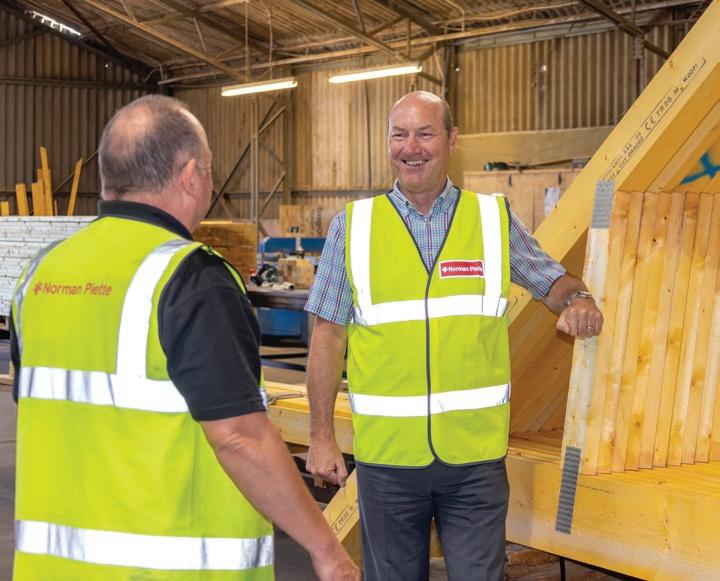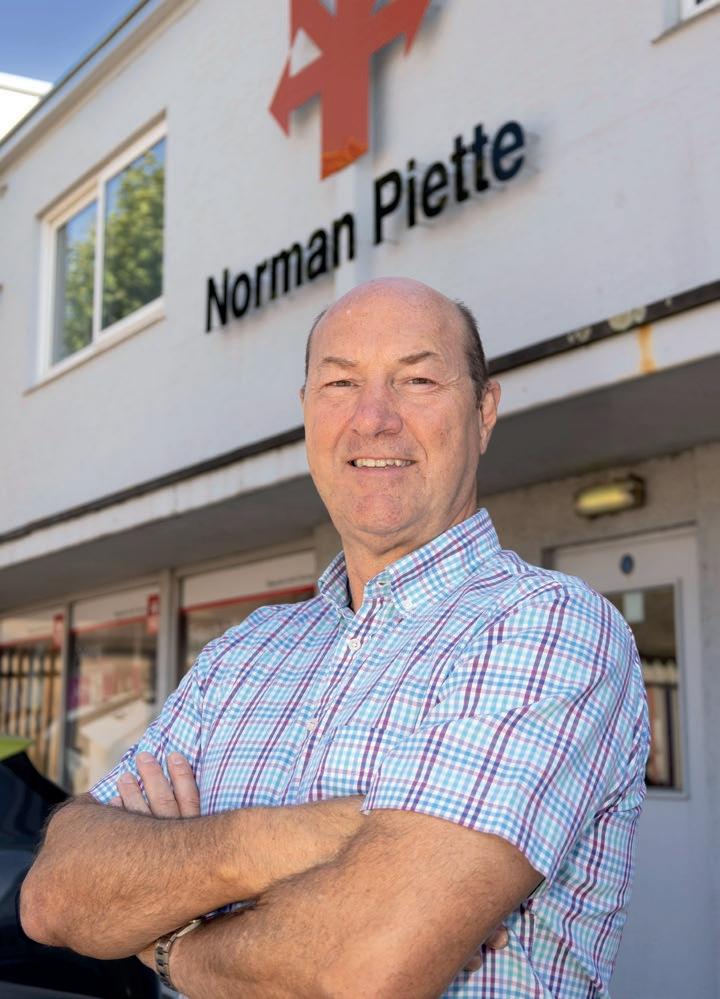
8 minute read
John Bampkin
As the chief executive officer of the Norman Piette Group, John Bampkin is well placed to understand the challenges recently facing the industry as it deals with the myriad of supply issues caused by Covid, Brexit and the current global instability. Add in his role as chair of local industry body, the Guernsey Construction Forum (GCF), and he has a wealth of insight into the current state of play with the construction sector, and why it matters for the island.
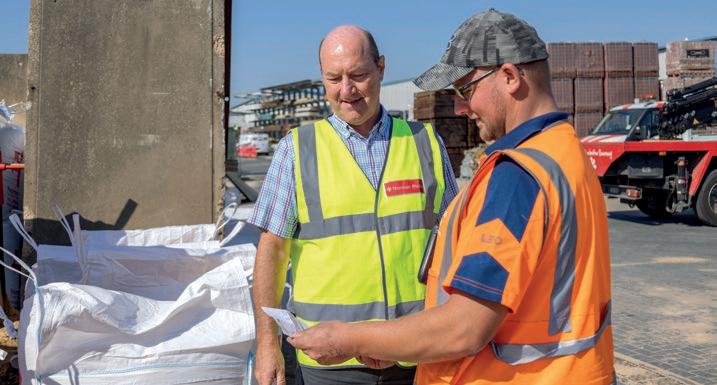
Advertisement
John Bampkin is a relative newcomer to the island, but he’s certainly not to the industry. With 40 years of experience behind him, he arrived in Guernsey to start the role at Norman Piette right at the beginning of the pandemic. It would have been a baptism of fire for anyone, but John says while he found the pandemic tough on a personal level, it was a professional challenge he embraced.
“I was brand new into the business when Covid hit. We actually closed down the store the same week that I took over as CEO. So rather than focusing on growing and improving the business, my first job was to close it down and ask the staff to accept a temporary pay cut [which has since been paid back]. It sounds very difficult, but actually I think it helped that I wasn’t already embroiled in the business.
“It was relatively easy to be very detached and look at the Covid restrictions objectively to work out how we could operate. Norman Piette’s operations director, finance director and I worked out a plan, which was backed up with unbelievable commitment from our colleagues on the ground. I was hugely impressed with how prepared my colleagues were to go far beyond what I expected to try to keep the business operating.”
In fact, John credits the challenges of the pandemic with allowing him to quickly assume leadership of the organisation and forge solid relationships with colleagues. “I was working very hard to try to find the answers and I was very grateful that the team followed and supported me. We had no rulebook, it was a case of making decisions on the ground day by day and allowing my colleagues a certain amount of autonomy to be agile and judge the correct course of action for themselves. It was a huge professional challenge, but one I believe we handled very well.”
That was two and a half years ago and John admits that, like most, he had no idea what the intervening period would bring. From material shortages to the post-lockdown industry boom in the island, it’s been a turbulent couple of years.
“I think the challenges post-lockdowns have been tougher than the lockdowns themselves. The materials shortages in the industry have been well publicised, and we have clearly been finding it very difficult to get some materials. Since starting the role, I’ve almost doubled the stock team to try to create more links and widen our net further for potential suppliers. We’re now using many more suppliers and trying to bring in products from all over the world.
“However, the very nature of the industry means there are some real limitations on that. For items such as sand, aggregate, bricks and blocks, we simply can’t go too far afield as the shipping costs then become prohibitive. We now have three or four different places in Europe that we can deal with, so we try to protect our supply in that way as much as possible.” I WAS WORKING VERY HARD TO TRY TO FIND THE ANSWERS AND I WAS VERY GRATEFUL THAT THE TEAM FOLLOWED AND SUPPORTED ME. WE HAD NO RULEBOOK, IT WAS A CASE OF MAKING DECISIONS ON THE GROUND DAY BY DAY AND ALLOWING MY COLLEAGUES A CERTAIN AMOUNT OF AUTONOMY TO BE AGILE AND JUDGE THE CORRECT COURSE OF ACTION FOR THEMSELVES.

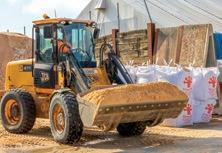
But while getting hold of the goods is one issue, the price of them is another. A perfect storm of factors has resulted in price increases across the board, which has been another tricky aspect to manage.
“These price rises and costs are something we have never seen before. Post-Covid it was just starting to settle down again into single digit increases for most suppliers, then when the Ukrainian war began we immediately returned to double digit increases. Up until now, we’ve only increased our prices by the manufacturers’ costs, but we’ve just had to increase our own by 1%. It’s due to the large increases in fuel and energy costs which we simply can’t absorb. We’ve tried to support the industry as much as possible, but to carry on providing services we needed to introduce that charge.”
While John has been facing the global supply issues, he has also had to get to grips with the constant quirks of island life. Working in an industry that buys and sells products, having them on-island and available is key.
“The logistics in Guernsey are much more challenging than the mainland. When I arrived, I was used to being able to order goods and know that they would arrive. Here, it can all be very uncertain. Stock management is therefore something that I’ve really focused on. It’s so important in this industry – if we don’t have the items that people want on the shelves then we’re not fulfilling our obligation to the customer.” Meeting the needs of those customers is something John is clearly passionate about, and he freely admits the people he deals with are where he finds his job satisfaction.
“It’s such a complex industry – we are dealing with thousands of products going into all sorts of markets to all kinds of customers – from national house builders down to Mr Jones who wants to fix his shed – and we need to be providing a personal service to all of them. 80% of business trade is about relationships and being honest and loyal so you retain the repeat business.
“I am very people orientated. I absolutely believe that you get results when you’re good with people and work with them and focus on them. Whether that is customers, staff, suppliers, shareholders or colleagues – all of them are my number one priority.”
When John took on the Norman Piette role, career development for others was high on his priority list.
“The most satisfying part of my job is developing my people, both in terms of improving the roles they are doing now and their career progression. Nothing gives me greater pleasure than promoting someone and knowing they are ready for it and I’ve contributed to that achievement.”
His support for others comes from a solid background in the industry and a wealth of experience he can share. When he left school at 15, his family connections in the industry saw him move into a job within a timber yard at a builders merchant. Loving the industry, and the product, from the start, he soon started to move up the ranks into sales, branch and then regional management before arriving in Guernsey. Now he’s here, he says he wouldn’t change a thing.
“I fell in love with Guernsey straight away. It’s a beautiful place and I love the community spirit and the feeling of safety, which I don’t think can be underestimated when you’ve lived elsewhere. The island has also taught me to live at a different pace of life and to embrace more of a work life balance – working 70 hours per week isn’t good for anyone.”
But while John fully appreciates the benefits of the island, as a relative newcomer he is also well-placed to see its flaws.
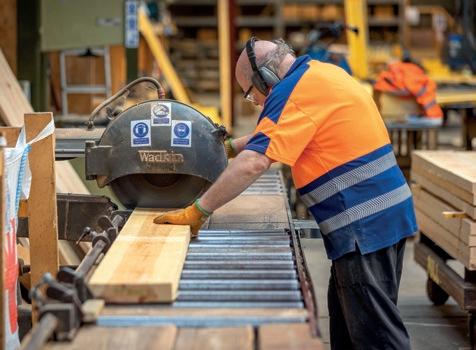
“There is a real challenge here in balancing progress and tradition, and I think the island needs to work really hard to get the balance right. The community needs to really consider what it wants the island to look like as there are potential problems whichever way we turn. I think we need to be brave and we need to challenge each other to make sure that this stays a positive, wonderful place to live.
“Guernsey often reminds me of how the UK was when I was young. The mainland has now lost a lot of its community based culture, but here it is still really important. Relationships, networking and reputation are critical in the island, and I think that’s a really good thing. Within the GCF I work with guys who are commercial competitors, but they’re also willing to work together and collaborate because they believe we are one community and they want to improve things for everyone.”
DOING GOOD FOR GUERNSEY
With his newfound love of Guernsey, John is keen that Norman Piette makes a positive difference to the island in any way it can.
The company is part of a scheme working with the Guernsey Prison Service to help ex-offenders get back into work. For John, it’s exactly the sort of way he likes to help: “I am a big believer that you should help people to do something for themselves rather than do it for them. This scheme allows us to help and support former prisoners to help themselves.” Additionally, Norman Piette is on board to help local charity GROW with its major project to create purpose-built modern facilities to help train and mentor its staff. Volunteers from the company will be helping to build one of the timber framed constructions on the site. Norman Piette will be supporting the initiative by helping with the price of materials, design support, and some skilled labour resources as well as donating money raised through their Christmas party staff raffle.
